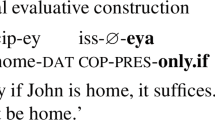Abstract
I propose a semantics for a class of English predicates characteristically associated with possibility. The central idea is that such predicates are typically associated with an ordering source, and that differences among them are due to differences in their ordering sources. The ‘dispositional predicates’ that have been central to philosophical discussions are shown to be derivable as a special case from this more general class.
Similar content being viewed by others
References
Bhatt, R. (1999). Covert modality in non-finite contexts. Ph.D. Thesis, University of Pennsylvania.
Carlson, G. N., & Pelletier, F. J. (Eds.). (1995). The generic book. Chicago: University of Chicago P.
Carnap, R. (1936). Testability and meaning, I. Philosophy of Science, 3, 419–471.
Choi, S. (2008). Dispositional properties and counterfactual conditionals. Mind, 117, 795–841.
Chomsky, N. (1970). Remarks on nominalization. In R. A. Jacobs & P. S. Rosenbaum (Eds.), Readings in English transformational grammar. Waltham, MA: Ginn and Company.
Condoravdi, C. (1989). The middle: Where semantics and morphology meet. MIT Working Papers in Linguistics, 11, 18–30.
Fara, M. (2005). Dispositions and habituals. Noûs, 39, 43–82.
Goodman, N. (1954). Fact, fiction, and forecast. Cambridge, Mass.: Harvard UP.
Heim, I. (1982). The semantics of definite and indefinite noun phrases. Ph.D. Thesis, University of Massachusetts, Amherst.
Kratzer, A. (1981). The notional category of modality. In H. J. Eikmeyer & H. Rieser (Eds.), Words, worlds, and contexts. Berlin: de Gruyter.
Kratzer, A. (2013). Modality for the 21st century. In S. R. Anderson, J. Moeschler, & F. Raboul (Eds.), The language–cognition interface. Geneva: Librairie Droz.
Lewis, D. (1997). Finkish dispositions. The Philosophical Quarterly, 47, 143–158.
Mackie, J. L. (1972). Truth, probability, and paradox. Oxford: Oxford University Press.
Maier, J. (2015). Dispositions and ergativity. The Philosophical Quarterly, 65, 381–395.
Manley, D., & Wasserman, R. (2008). On linking dispositions and conditionals. Mind, 117, 59–84.
Marantz, A. (1997). No escape from syntax: Don’t try morphological analysis in the privacy of your own lexicon. University of Pennsylvania Working Papers in Linguistics, 4, 201–227.
Martin, C. B. (1994). Dispositions and conditionals. The Philosophical Quarterly, 44, 1–8.
McKitrick, J. (2003). A case for extrinsic dispositions. Australasian Journal of Philosophy, 81, 155–174.
Portner, P. (1998). The progressive in modal semantics. Language, 74, 760–787.
Portner, P. (2009). Modality. Oxford: Oxford University Press.
Quine, W. V. (1970). Natural Kinds. In R. Hempel (Ed.), Essays in honor of Carl G. Dordrecht: D. Reidel.
Ryle, G. (1949). The concept of mind. Chicago: University of Chicago Press.
Schäfer, F. (2009). The causative alternation. Language and Linguistics Compass, 3, 641–681.
Vetter, B. (2014). Dispositions without conditionals. Mind, 123, 129–156.
Author information
Authors and Affiliations
Corresponding author
Rights and permissions
About this article
Cite this article
Maier, J. Modal predicates. Linguist and Philos 39, 443–457 (2016). https://doi.org/10.1007/s10988-016-9196-1
Published:
Issue Date:
DOI: https://doi.org/10.1007/s10988-016-9196-1



